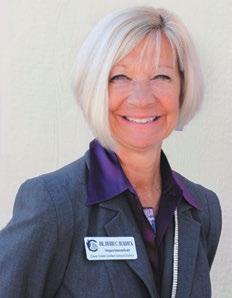
8 minute read
Health
Flu in a World of COVID-19: Why This Year’s Flu Shot is Critical
By Dr. Tara Ostrom
It’s 100+ degrees out, so you may not be thinking about flu season. However, there are sporadic cases of flu here in Arizona, according to community health data from Maricopa County, and already doctors are recommending people make a plan to get their annual flu shot when it becomes locally available. In addition, this year’s COVID-19 pandemic has shaken our nation and, of the many lessons we’ve learned as a result of this public health crisis, one of the most impactful is the importance of immunizations and vaccinations. For example, in part due to COVID-19, 30 percent of Americans said they are now more likely to get a flu vaccine this year.
Unfortunately, many adults still are under the mistaken impression that vaccinations are not needed for themselves or their children or are concerned about side effects. The reality is quite the opposite: in the U.S., vaccines have greatly reduced or eliminated many infectious diseases that once routinely killed or harmed infants, children and adults. This year, seasonal flu vaccination is especially important as the stress on hospitals will be greatest if the COVID-19 and influenza epidemics overlap and peak around the same time.
While it isn’t possible to predict the future, the Centers for Disease Control and Prevention (CDC) believes it’s likely that flu viruses and the virus that cause COVID-19 will both be spreading in the fall and winter. So while vaccination is important, given pandemic concerns, how you go about getting your flu shot may look a little different. Additionally, some common places where people get their flu shots, such as workplaces, may not offer them this year due to social distancing challenges.
To help minimize risks, there are certain safety precautions and new protocols that health care facilities are implementing in order to help ensure that getting a flu shot is safe and accessible for all patients. For example, OptumCare Primary Care has been following the CDC’s guidelines to help ensure safe delivery of care during vaccination visits including: 1. Screening all patients for COVID-19 symptoms both when they schedule their appointment and when they arrive. 2. Assigning a dedicated screener at each clinic entrance checking the temperature of all patients, visitors and staff prior to coming into the facility. 3. Following social distancing protocols while waiting. 4. Ensuring all rooms are disinfected after each patient’s visit. 5. All staff, patients, and visitors wear surgical masks and staff practice respiratory hygiene, cough etiquette and hand hygiene.
This year’s health crisis has made it a critical year for ensuring that you receive your annual flu vaccination. The cost of the flu vaccine is often covered by your health plan, whether you buy health insurance on your own, receive health benefits from your employer, or through a Medicare or state Medicaid program. Check with your health insurer and then schedule an appointment by calling your physician or going to a nearby urgent care clinic. Make sure you’re making your health a priority by getting your flu shot this year.
Dr. Tara Ostrom is the associate medical director with OptumCare Primary Care.
Making Smiles Beautiful For Over 26 Years 34522 N Scottsdale Rd, Ste. 140, Scottsdale 480-488-4444 www.dentalcarescottsdale.com



• 26 Years of proven excellence • Ohio state top graduate • 5 star patient review- “Top Doc” • One-stop destination for all your dental needs including cosmetics, single implant and All on Fours • Comfortable dentistry • The retired dentists choice • Ask about our whole family specials
New Patient Special $99 EXAM, CLEANING, X-RAYS, WHITENING*
*Not valid with other discounts or insurance. In absence of decay. Expires Sept. 2020 Enjoy member benefi ts at over 500 courses worldwide through our Troon Privé Privilege and Troon Advantage Programs

NON-RESIDENT MEMBERSHIP AVAILABLE NEW PRICING STRUCTURE! ONLY $6,000 (couple) / $4,200 (individual) to join!
• 36 holes of walkable golf • Newly renovated clubhouse and restaurant • No cart fees • No food and beverage minimum • Member owned private club • Located just minutes from Scottsdale • Golf groups of all levels to join

18731 E. Four Peaks Blvd. Rio Verde, AZ 85263 Megan Liborio Sales & Marketing Director 480.471.3410 rioverdecc.com mliborio@rioverdecc.com
Rio Verde is proudly managed by
Health
Contributed by HonorHealth
September is Healthy Aging Month. For more than 20 years, this celebratory health month is meant to provide inspiration and motivation for aging adults to improve their physical, mental, and social well-being.
Understandably, during a pandemic like the one we are facing today, social distancing remains a high priority. However, your regular check-ups and doctor’s appointments are activities you shouldn’t avoid. According to a recent research published by GoodRx, more than 75 percent of Americans have had some aspect of their healthcare disrupted due to COVID-19 and are canceling or delaying medical appointments. Delaying these important medical visits can lead to serious complications and can have negative consequences.
SO WHAT SCREENINGS ARE IMPORTANT?
Screenings are tests that physicians use to detect certain diseases or health conditions before any obvious signs or symptoms arise. Common screenings include: • Cholesterol • Heart disease • High blood pressure • Diabetes • Cancers: Skin, Colorectal, Prostate, Breast, Lung and Cervical
SCREENING GUIDELINES
Cholesterol: As a general guideline, cholesterol should be below 200. If your cholesterol is 150 at age 22, then 180 at 25, you can see that there’s been a steady increase over the three years. It’s important to get checked out while you are young, so you have a point of reference. Heart disease: A screening for heart disease is recommended when you are in your 20s. This can be done by having a blood test where your cholesterol levels would be checked. Blood pressure: Blood pressure screening should be taken annually, beginning at age 45. Osteoporosis: Women should begin osteoporosis screenings no later than age 65. Diabetes: Testing for diabetes should begin at age 45 and continue every three years.
WHAT TYPE OF CANCER SCREENINGS DO I NEED?
Discuss with your primary care doctor which cancer screenings are appropriate for you. Although guidelines suggest that you have cancer screenings at some point in your life, screening tests may be done sooner or more frequently if you have a known risk factor such as: • A personal history of cancer • Two or more first-degree family members (parent or sibling) who’ve had cancer • A gene mutation linked to a specific type of cancer
Your physician will help you decide which screening exams are right for you and when they make the most sense.
Skin cancer: Skin examinations should occur every three years between ages 20 and 40, and every year for anyone age 40 and older. Colon cancer: Colon cancer screenings should begin no later than age 50, and continue every five years until age 75. Breast cancer: Starting at age 40, talk with your doctor about whether screening mammography is right for you. Starting at age 50, get a mammogram at least every other year. If you’re at high risk for breast cancer based on your personal or family medical history, or if you have a genetic breast mutation, talk to your doctor to see if you should also get other tests, such as breast MRI and ultrasound. Prostate cancer: Men at average risk of prostate cancer should have this discussion starting at age 50. Lung cancer: The U.S. Preventive Services Task Force guidelines recommend an annual screening beginning at age 55 for people with a 30-pack a year history of smoking. Cervical cancer: Cervical cancer screenings should begin at age 25. The best way to catch endometrial cancer early is by having a regular schedule of pelvic exams with your HonorHealth gynecologist. If your physician detects something suspicious, subsequent tests may be ordered and may include an ultrasound and endometrial biopsy to extract cells from the endometrium.
With cancer, early detection can save your life. Catching cancer early — before it’s had a chance to spread to other organs and before symptoms surface — can make it easier to treat and cure.
Let’s make September the month for screenings and get yourself checked out.
The HonorHealth Medical Group offers comprehensive primary care services to patients of all ages, from pediatric to geriatric. With HonorHealth, you’ll find more access points to quality care than ever with more than 70 primary care, specialty care and urgent care locations throughout the Valley. HonorHealth also offers an array of cancer screening services. The Virginia G. Piper Cancer Center at HonorHealth is known throughout the Southwest for its commitment to providing personalized cancer care.
THE SHOW MUST GO ON! 2020 Empty Bowls Online Art Auction and Bowl Sales!!

We hope you can join us virtually this year, purchase a bowl and/or bid on some fabulous artwork. September 1 - October 16 at 1 pm See our website for complete details. Thank you for your continued support.
480.488.1145
www.foothillsfoodbank.com/event/empty-bowls

















